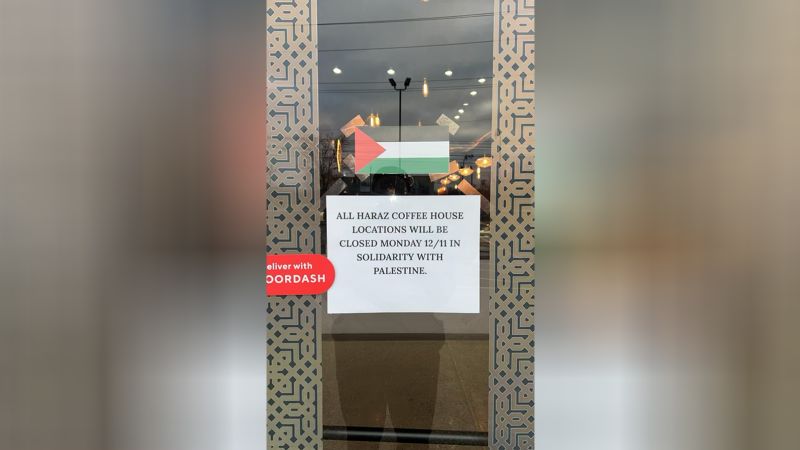Haraz Coffee House in Dearborn, Michigan, is usually teeming with customers eager for a taste of its delicious Yemeni coffee – but on Monday there wasn’t a single person in sight.
The popular café on Michigan Avenue was closed, as its owner and employees participated in a global strike calling for a ceasefire in the devastating war in Gaza.
“Today is the day to put everything that matters in our lives aside to focus on the lives of those in Gaza and to call for an immediate ceasefire,” owner Hamzah Nasser told CNN. He closed all 12 locations of his cafés in Michigan, Kentucky, Texas, Illinois and California.
Palestinian groups announced the global strike on Saturday, one day after the United States vetoed a UN Security Council resolution calling for an immediate humanitarian ceasefire. The strike on Monday and Tuesday saw businesses temporarily close, employees call out of work, consumers refrain from shopping and students skip classes.
The call to strike was honored in communities across the world, including many in the United States. More than 270 businesses closed on Monday in the Chicago area alone, according to the Coalition for Justice in Palestine, a local activist organization. Businesses taking part included fitness studios, auto repair shops, salons and private schools.
States across the country, from New York to Texas to California, also saw businesses close. Meanwhile, an untold number of Americans took to social media to say they would call out of work or refrain from making purchases.
Those who promoted the strike include Palestinian journalists Motaz Azaiza and Bisan Owda, who gained millions of followers on social media through their coverage of the war.
“This strike is important because everyone is united in saying no and everyone is united in their support for a ceasefire that stops all actions against Gaza once and for all,” Owda said in an Instagram video.
“This strike is painful because it’s a form of peaceful protest, however at the same time, it harms the economies and the politicians who refuse to see and hear their people’s insistence on ceasing the fire against Gaza.”
Alex Tarzikhan, a legal adviser at a human rights organization in Washington, DC, says she called out of work in solidarity with Palestinians and other people of conscience.
Tarzikhan has been closely monitoring the conflict since October 7, when Hamas launched a brazen attack in Israel, killing more than 1,200 people and taking more than 240 others hostage.
Israel responded by imposing a siege and launching deadly airstrikes across Gaza, destroying homes, schools and hospitals in the densely populated territory. More than 18,000 Palestinians, 70% of whom are women, children and elderly, have so far been killed in the attacks, and more than 50,000 others injured, according to the Palestinian Ministry of Health, which draws its figures from sources in Hamas-run Gaza.
Tarzikhan says she regularly checks on Owda and other Palestinian journalists, and is often left feeling helpless by the graphic and heart-wrenching images they post on social media.
“One of the first things I do as I wake up and before going to bed is check their (Instagram) stories to make sure they are still alive,” Tarzikhan said. “I decided to join (the strike) because I felt like I owed them that much, morally I wasn’t okay continuing on with my daily routine knowing that they had issued a cry for help.”
Owda’s initial post calling for the strike was liked more than 830,000 times, with followers across the world pledging to participate.
After seeing the call, Alexandra Bowman closed her art business in Oakland, California: “No emails, no banking, no spending money whatsoever.”
Bowman said she was motivated by empathy for Palestinians, and instead of working, she and her family spent their time calling and emailing public officials to demand a ceasefire.
“All of our liberties as human beings are tied together,” Bowman said. “If I openly opposed police brutality against Black Americans in 2020, I cannot be silent while an entire group of people are targeted by state sanctioned violence. At its core, collective freedom is a practice in empathy, and what is happening to the Palestinian people goes against everything I believe in.”
Josh, who lives in Queens, New York, says he was unable to fully call out of his job in ad sales, but did manage to scale back the hours. He also refused to spend any money.
Josh withheld his last name out of fear of reprisal from his employer, who he believes may take issue with his politics.
“I want the world to realize what colonization looks like in 2023 and that it’s not simply a concept you learn in history class, but instead an ongoing horror imposed on the people of the world by Western powers, and a genocide imposed by colonialism is what is happening in Gaza and Palestine,” he said.
Some who participated in the strike said they did so at great risk to their livelihoods.
Heather, who also withheld her last name out of fear of reprisal, closed her restaurant in Jersey City, New Jersey, because she did not feel it was right to break the strike.
“I think if closing my business brings to light what’s going on and educates just one person then I made my impact,” she said. “And that is why I continue to be vocal and align my business and values with causes that I am passionate about.”
In nearby Paterson, a city affectionately called “Little Ramallah” for its large Palestinian community, stores lining the downtown area were also closed on Monday.
Heather says the response has been mixed. In addition to the support of patrons, some in her community have sent her threatening messages online.
“The hate I am receiving for closing my business or supporting a ceasefire has me questioning humanity and how anyone can support any cause in which children are murdered,” she said.
Still, Heather says she can tell more people are beginning to understand the Palestinian struggle: “I feel like the world has finally woken up.”
Americans who participated in the strike told CNN they feel especially guilty for the US’ support of Israel. In addition to vetoing a UN Security Council resolution calling for a ceasefire, the US provides Israel with diplomatic and military support, including billions of US tax dollars in annual military aid.
The US State Department on Friday sent lawmakers an emergency declaration for the sale of $106 million worth of munitions to Israel, bypassing the standard 20-day period that congressional committees are typically afforded to review such a sale.
“The United States is committed to the security of Israel, and it is vital to US national interests to assist Israel to develop and maintain a strong and ready self-defense capability. This proposed sale is consistent with those objectives,” a State Department spokesperson told CNN on Saturday. “We continue to be clear with the government of Israel that they must comply with (international humanitarian law) and must take every feasible step to avoid harm to civilians.”
But strikers say the mounting death toll shows the US needs to do more to restrain Israel and protect civilians, and that economic pressure could help make that happen.
“I think if folks would take a real good look at how change and revolution has taken place historically, they would see that boycotts and strikes are actually effective,” Josh said, pointing to examples throughout US history, including Rosa Parks and the Montgomery Bus Boycott.
Others cited the global boycott, divestment and sanctions movement that helped topple South Africa’s apartheid regime in the early 1990s. Bowman said it’s proof that people aren’t completely helpless, and by uniting they can have a significant impact on international affairs.
“If our government cares about anything, it is the economy, and we collectively have the power to make a real change if we use our money wisely,” she said.
“At the absolute bare minimum, trying to make a change — even if futile — is never worthless because it proves that we still have our humanity,” Bowman added. “It shows the people in Gaza who are suffering and fighting for their life that people see them and care.”
CNN’s Natasha Bertrand contributed to this report.
Read the full article here




